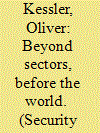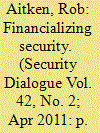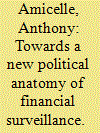|
|
|
Sort Order |
|
|
|
Items / Page
|
|
|
|
|
|
|
| Srl | Item |
| 1 |
ID:
105944


|
|
|
|
|
| Publication |
2011.
|
| Summary/Abstract |
While security and finance are certainly different social spheres, the fact that we can detect similar shifts in both points to the existence of something that precedes these 'realities'. If finance and security are said to be different, intertwined and related, the question then arises as to what it is that constitutes the differences and similarities between them. This article argues that further inquiry into the boundary between the two leads us to understand processes of securitization and financialization as constitutive processes by which actors, behaviours, practices or communications are considered to be economic or securitized. To capture processes of financialization, the article draws on systems theory in general and the concept of functional differentiation in particular.
|
|
|
|
|
|
|
|
|
|
|
|
|
|
|
|
| 2 |
ID:
105940


|
|
|
|
|
| Publication |
2011.
|
| Summary/Abstract |
The logics of 'finance' and 'security' have been enmeshed within each other in complicated ways since at least the start of the 20th century. As fields deeply alive to the possibilities and dangers associated with risk and uncertainty, finance and security occupy overlapping but uneven fields of operation. This article examines one particular financial mechanism - political prediction markets - in order to trace out the tensions and intersections of finance and security in one particular site. Political prediction markets are designed to harness the predictive power of the market to address an inherently uncertain object - the weather, political events, terrorism, etc. A series of recent cases - most notoriously a proposal by the Pentagon to construct a 'terrorism futures market' - have sought to recast political prediction markets as a security practice and to enlist these markets in the ongoing 'war on terror'. This article argues that these attempts at financializing security offer a particularly useful glimpse into one point of overlap between security and finance. As markets constructed to measure and manage uncertainty, experiments in security prediction markets foreclose political space not only as a ritual of securitization that places certain issues above or beyond political deliberation but also as a reinvocation of a conception of 'finance' as a somehow rational and technical domain. As the terrorism futures case reminds us, however, the rational ambitions associated with these two governmentalities of financialization and securitization can become corroded or can lose coherence in unpredictable ways. It is in the political tension that is generated through such corrosions that the future of these kinds of experiments in the financialization of security will ultimately be decided.
|
|
|
|
|
|
|
|
|
|
|
|
|
|
|
|
| 3 |
ID:
105941


|
|
|
|
|
| Publication |
2011.
|
| Summary/Abstract |
The concept of 'resilience' was first adopted within systems ecology in the 1970s, where it marked a move away from the homeostasis of Cold War resource management toward the far-from-equilibrium models of second-order cybernetics or complex systems theory. Resilience as an operational strategy of risk management has more recently been taken up in financial, urban and environmental security discourses, where it reflects a general consensus about the necessity of adaptation through endogenous crisis. The generalization of complex systems theory as a methodology of power has ambivalent sources. While the redefinition of the concept can be directly traced to the work of the ecologist Crawford S. Holling, the deployment of complex systems theory is perfectly in accord with the later philosophy of the Austrian neoliberal Friedrich Hayek. This ambivalence is reflected in the trajectory of complex systems theory itself, from critique to methodology of power.
|
|
|
|
|
|
|
|
|
|
|
|
|
|
|
|
| 4 |
ID:
105939


|
|
|
|
|
| Publication |
2011.
|
| Summary/Abstract |
Global governance links security and finance in four important ways. First, the combined effect of the financial crisis and the global 'war on terror' has been an increasingly explicit merging of finance and security concerns. Second, security and finance were arguably closely linked in the rise of the modern form of government as far back as the late 17th century, a relation still evident in the form of 'government securities' such as bonds and treasuries, which in 2010 rose to new prominence in the various sovereign debt crises of the Eurozone. Third, a considerable literature has shown that finance and security share a claim to universal applicability in (all) other social spheres, resulting in various forms of financialization and securitization ( Martin, 2002; Langley, 2007; Buzan et al., 1998). Finally, not only have the liberal strategies of finance and security converged in a common vocabulary and epistemology of risk (management), but this technology of governing the future is currently undergoing a critical epistemic transformation that in turn implies finance and security in new relationships.
|
|
|
|
|
|
|
|
|
|
|
|
|
|
|
|
| 5 |
ID:
105943


|
|
|
|
|
| Publication |
2011.
|
| Summary/Abstract |
The implementation of the ongoing anti-money laundering/counter-terrorism financing (AML/CTF) drive within the private sector reflects a tension between the logic of state sovereignty and that of neoliberal governmentality. In this article, we show that the main concrete output of two decades of global policy in this area is found in the routinization of professional interactions between banks and law enforcement agencies. Banks recruit former law enforcement officials and attempt to establish informal ties with the police or intelligence bodies. They are also actively involved in intelligence-led policing missions and have become embedded in interdependent relationships with law enforcement agencies. Drawing on data from 75 interviews conducted with AML/CTF professionals within France, the article shows how new everyday professional routines in the banking sector reflect governmentality in the making.
|
|
|
|
|
|
|
|
|
|
|
|
|
|
|
|
| 6 |
ID:
105942


|
|
|
|
|
| Publication |
2011.
|
| Summary/Abstract |
This article examines dynamics of financial surveillance and risk-based regulation in the context of ongoing activities to combat money laundering and terrorist financing. Close analysis of the situation in the UK reveals entangled forms of co-regulation and ultimately co-production of surveillance that challenge 'institutional boundaries' of the state regarding policing and intelligence practices. It is argued that ongoing transformations in the anti-money laundering field reveal a dual movement that combines forms of indirect administration with a process of 'neoliberal bureaucratization'. The article aims to show how current policies against 'dirty money' still paradoxically work on the basis of heterogeneous goals and misapprehensions between 'professionals of security' and 'professionals of finance'.
|
|
|
|
|
|
|
|
|
|
|
|
|
|
|
|
|
|
|
|
|